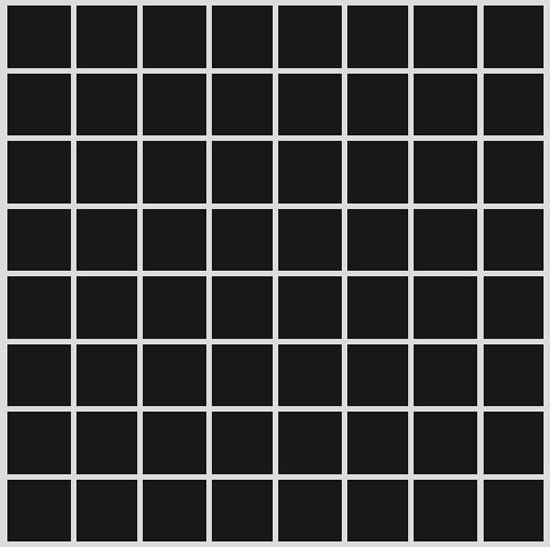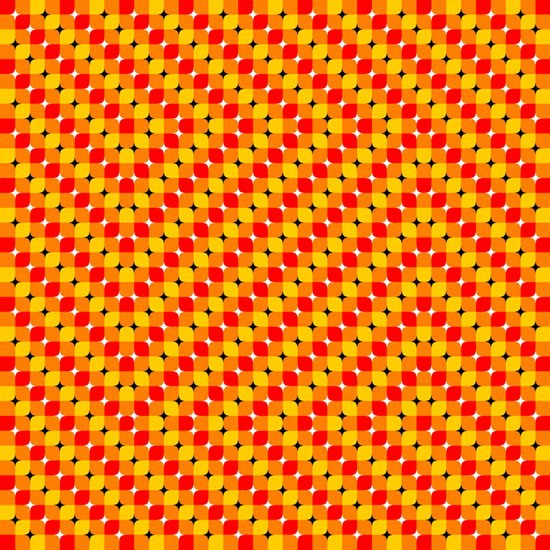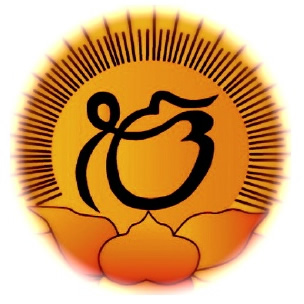| |
|
More Singularity
Ten
Illusions, One Reality

Instructions
1) Stare 30 seconds at dots on end of girl's nose.
2) Then, turn your gaze to a blank wall or ceiling.
3) At the same time, blink rapidly and repeatedly.
4) You should now see same portrait in full color.

Gaze at the image until you're aware of grey connecting spots.
Then, look directly at the grey spots, they will have disappeared.

The inner square only appears to move.
The
following includes excerpts from
Communion With God
by Neal Donald Walsch

The
Illusion of Need
This
is not only the first illusion, but the grandest. On this illusion
all other illusions are based.
Everything that you currently experience in life, everything that
you feel moment to moment, is rooted in this idea, and your thoughts
about it.
Need is non-existent in the Universe. One needs something only if
one requires a particular result. The Universe does not require
a particular result. The Universe is the result.
Need is likewise non-existent in the mind of God. God would need
something only if God requires a particular result. God does not
require any particular result. God is that which produces all results.
If God needed something to produce a result, where would God get
it? There is nothing that exists outside of God. God is All That
Is, All That Was, and All That Will Ever Be.* There is nothing that
is, that is not God
You may better grasp this idea if you use the word "Life"
in place of the word "God." The two words are interchangeable,
so you cannot alter the meaning; you merely increase your understanding.
Nothing that Is, is not Life. If Life needed something to produce
a result, where would Life get it? There is nothing that exists
outside of Life. Life Is All That Is, All That Was, and All That
Will Ever Be.

The
Illusion of Failure
The
idea that God's Will, assuming that God has one, could not be
done, runs counter to everything you thought you knew about God
-- namely, that God is all-powerful, ever present, the Supreme
Being, the Creator -- but it is one that you nevertheless enthusiastically
embraced.
This illusion produces the highly improbable but very powerful
illusion that God can fail; God can desire something but not get
it. God can desire something but not receive it. God can need
something but not have it.
In short, God's Will can be thwarted.
This illusion is quite a stretch, for even the limited perception
of the human mind can spot the contradiction. Yet your species
has a rich imagination and can stretch credibility to the limit
with amazing ease. You have not only imagined a God with needs,
you have imagined a God who can fail to have his needs met.
How have you done this? Once again, through the use of projection.
You have projected your self upon your God.

The
Illusion of Disunity
The
only escape from the conundrum of the second illusion is to create
a third: The Creator and the creation are not one.
This requires the human mind to conceive of the possibility of
the impossible - that That Which is One is not One; that That
Which Is Unified is really separated.
This is the Illusion of Disunity - the idea that separation exists.
Your species reasons that if creations are separate from the Creator,
and if the Creator allows the creations to do whatever they please,
it's then possible for the creations to do something that the
Creator does not want them to do. Under these circumstances, the
Will of the Creator can be thwarted. God can have something but
not give it. Disunity produces the possibility of failure, and
failure is only possible if Need exists. One illusion depends
upon another.

The
Illusion of Insufficiency
It
arises out of the third illusion, for without the idea of disunity,
the Illusion of Insufficiency is unsupportable. If there is only
One Thing, and that One Thing Is All That Is, there can be no
insufficiency of any kind, because That One Thing Is Everything,
and thus ...
It Is Sufficient unto Itself.
This is a statement of the Nature Of God.
This is not however, the experience of humans, because humans
imagine themselves to be separate from God, and separate from
each other as well. Yet no human is separate from God, since God
is Everything That Is. Therefore humans are not and cannot, be
separate from each other.

The
Illusion of Requirement
The
existence of Insufficiency leads rapidly and inevitably to the
idea of the next illusion.
If there is enough stuff, there is nothing you have to do to get
whatever it is that you want or need. You would just reach out
and it will be there. But that is not how humans decide that it
is. They say there is not enough. So now they face the question:
How does one get enough? How does one qualify?
You imagine that there must be something that you have to do in
order to get the stuff of which there is not enough - something
that would allow you to lay claim to it without argument. This
is the only way that you can figure out how to get everything
- including God - divided in your favor without killing and squabbling.
You imagine this to be the Requirement.

The
Illusion of Judgment
Your
decision that there is something that you must do in order to
obtain that of which there is not enough - including God - requires
you to answer difficult questions: How will it be determined whether
a person has met the requirement or not? And what happens to those
who have not?
Your answer to these questions produces the invention of Judgment.
Someone, you reason, must be the final arbiter. Since the Creator
is the one who established the requirement, it seems only logical
that the Creator is also the one to decide who has met the requirement
and who has not.
For a very long time your species has held the thought that there
is something you have to do in order to please God - and that
the failure to please God produces dire consequences. That you
came to such a conclusion is understandable. Looking around you,
you see that some people's lives go well, and some do not. Primitive
mind asks, why? And primitive mind came up with a primitive answer.

The
Illusion of Condemnation
There
has to be a consequence of Judgment. If it is true that Judgment
exists, there has to be a why.
Clearly, one is judged in order to determine whether one should
receive the rewards of meeting the requirement. That's how humans
construct it. Seeking insight, trying to find answers, you go
back to your original cultural stories, and to the first Illusions
on which they are based. You told your self that I separated you
from My Self when you failed to meet my requirement the first
time.

The
Illusion of Conditionality
In
order for Condemnation to exist, there must be something you don't
understand about Love.
This is your conclusion, and you invented Conditionality as a
characteristic of life in order to resolve the dilemma that this
presents.
Everything in life must be Conditional. Isn't this self-evident?
Some of the thinkers among you ask. Have you not understood the
second illusion? The outcome of life is in doubt.
Failure exists.
This means you can fail to win God's Love. God's Love is conditional.
You must meet the Requirement. If you do not meet the Requirement,
you will be separated. Is this not what the Third Illusion, the
Illusion of Failure, taught you?

The
Illusion of Superiority
Humans
conclude if Conditionality exists, then knowing the conditions
are necessary to enjoy and create the life - and the after life
that one desires.
This conclusion is unavoidable, as is: Those who know the conditions
are better off than those who do not. And it has not taken much
time for the human race to remove the word "off" from
the previous sentence.
Thus the idea of Superiority is born.
Superiority has many uses. Chief among them is providing inarguable
justification for doing whatever is needed in order to guarantee
that "enough" of everything - including God's Love -
is available. Knowing the conditions gives you the right to ignore
others, or seek to convert others, or simply eliminate others
who did not know the conditions, or agree to them.

The
Illusion of Ignorance
Increasingly,
as each illusion is piled upon the last, Life becomes more and
more difficult to figure out. Humans ask more and more questions
that can not be answered.
If
this is true, then why that? If that is true, then why this? It
isn't long before philosophers and teachers begin throwing up
their hands. "We don't know," they say, "and we
don't know if it's possible to know."
Thus, the idea of ignorance is born.
This idea serves so many purposes that it spreads quickly and
soon becomes the ultimate answer.
We just don't know.
Human institutions begin finding in this not only a refuge, but
also a certain kind of power. "We don't know" becomes
"We are not supposed to know," which becomes "You
do not have a need (or a right) to know," which finally becomes
"What you don't know won't hurt you."
This gives religions and governments the authority to say what
they choose, and act as they please, without having to answer
to anyone.
Where
there is hatred, sow love;
Where there is injury, pardon;
Where there is doubt, faith;
Where there is despair, hope;
Where there is darkness, light;
Where there is sadness, joy.
Seek not so much to be consoled, as to console; to be understood, as to understand; to be loved, as to love. For Love is who you are, and who you have always been. IT is all there ever was, is now, and ever shall be. Ad Sach, Jugad Sach, Hebi Sach, Nanak Hosi Bi Sach.
Love is all we be, so be IT.
You
are IT, is next.
 

More Web sites by
KhalsaWebMasters.com

|
|
|

